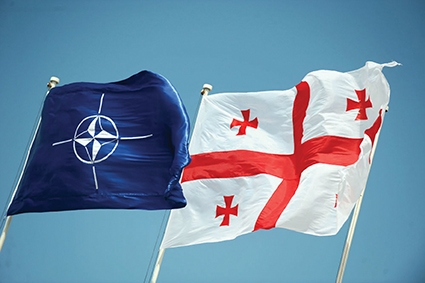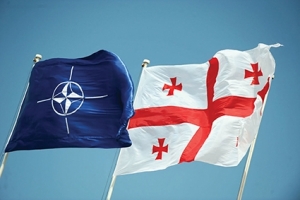Georgia's NATO Membership: A Definitive Decision Has (Yet) to Come
OP-Ed
The break-up of the Soviet Union marked the dissolution of the Warsaw Pact, whose members embarked upon integration with NATO. An intrinsic consequence of the Pact’s disappearance, however, was that NATO, and the United States in particular, found itself in disarray, incapable of organizing the Alliance’s expansion in a cohesive way, and having lost the means to leverage its foreign policy. During this new search in the aftermath of the "biggest geopolitical catastrophe," the United States was forced to revert to the pragmatic, case-by-case approach the country had been pursuing prior to the Second World War.
NATO’s expansion into Eastern Europe was marked by various important milestones, such as the reunification of Germany, the addition of the Visegrad Group (Poland, Hungary and the Czech Republic) at the 1999 Washington Summit, the admission of seven other countries of Central and Eastern Europe (Bulgaria, Estonia, Latvia, Lithuania, Romania, Slovakia and Slovenia) just prior to the 2005 Istanbul Summit, new members Albania and Croatia in April 2009 before the Strasbourg-Kehl summit, and the arrival of the Alliance’s most recent member, Montenegro, which formally joined NATO on 5 June 2017. In addition to these membership milestones, Bosnia and Herzegovina, Georgia and Macedonia have also been recognized as aspiring members—with each country facing its own hurdles and challenges to further progress on their path to NATO membership.
Dedicated Policy or (Ir)Rational Calculus? The Case of Montenegro
Whilst NATO’s expansion in the immediate aftermath of the fall of the Soviet Empire, which vanished into oblivion, can seem logical, some of the Alliance’s decisions pose serious questions in terms of consistency of action when it comes to pursuing a set of values entrenched in the North Atlantic Treaty. Moreover, in my view, some of these decisions have caused noticeable confusion—particularly regarding NATO’s ability to formulate and follow a "grand strategy" along its Eastern European and Southern-Eastern European flanks. This confusion is further aggravated by ever-increasing Russian resistance as a result of Moscow’s attempt to maintain a degree of "strategic geographical depth" in the name of pre-empting aggression.
Regarding the lack of consistency of the NATO policy following the Istanbul Summit, Montenegro's case presents a noticeable example of the volatility of the Alliance’s decision-making. To begin with, no referendum was held on the question (although, we must note that no referendums were held for the Slovenia and Spain NATO memberships either), despite the country having a population of barely 700,000 (and a military budget of only around EUR 60 million). Some (admittedly controversial) sources also estimate that fewer than 35 percent of Montenegrins are in favour of NATO membership. Opposing such membership, the prevailing political inclination has been one of military neutrality complemented by a policy of “keeping the door open” to economic co-operation with both the West and with Russia and the rest of "Eurasia".
All this leads us to believe that the case for Montenegro’s NATO membership is not to realize the long-held aspiration of the country’s citizens to embrace the values shared by their Western neighbors, but is instead a strategic move by the Alliance to ensure greater access to the Adriatic and to undermine Russia's position in the region. All in all, the sole consideration that was taken into account was neither the sustainability of the Montenegrin democracy nor its well-being, nor indeed its potential military contribution to the Alliance; rather, it was a cold geographical calculation of Montenegro’s proximity to the Adriatic and a thrust to eliminate the remnants of Russian influence in what was once "Russia's backyard" in the Balkans (with the exception of Serbia, of course).
Georgia: A Litmus Test for NATO Standards
There are of course quite a few challenges and concerns which continue to impede Georgia’s uphill struggle to join NATO—from the country’s immediate vicinity to the world’s greatest revisionist power to the illegitimate presence of foreign military forces on its territory, with a plethora of other headaches in between. Regardless of that, the country still performs fairly well in terms of the resilience of its fledgling democracy, the palatable foundations of its economic system, and its generally well-praised efforts to guarantee fundamental human rights. Moreover, as a "beacon of democracy", the hope continues to be that the Georgian example will show neighboring countries that true progress should ultimately prevail and that reforms are indeed rewarding, that the once hideously corrupt and paternalistic "former" republic may become proof of the viability of democracy.
It is also noteworthy that, unlike Montenegro, a plebiscite (an advisory referendum) was indeed held in Georgia on 5 January 2017, during which 75 percent of people questioned voted in favour of the country's integration with NATO. This result, unparalleled by any other polling of public mood or inclination, was evidently an explicit demonstration of the will of the people. Georgia’s plebiscite bears an even higher mark of credibility than the very recent vote in Ukraine, where only the national legislature was consulted and no nationwide enquiries were made. (The sole attempt in 2006 to hold a referendum on the question of NATO was unsuccessful, although admittedly the situation may now be quite different due to the ongoing conflict in the Donbas region and the occupation of Crimea).
And even if Montenegro’s membership is mainly about geography, Georgia also presents an interesting sui generis geographical case in terms of NATO’s southern flank, Russia’s aggressive moves in the region and the situation in the nearby Middle East. Added to this factor is the country's exemplary contribution to global security, a contribution which sometimes goes beyond Tbilisi’s means, but the most important elements are no doubt Georgia’s potential as a vivid advocate in the region for the desirability of pursuing truly Western and liberal values, its commitment and dedication to reforms, and its determination to maintain the pace of its efforts to strengthen political institutions, civil society and the economy regardless of internal shocks and external pressures.
A Price Tag for Delay
Undoubtedly, any delay or uncertainty on the path to joining the Alliance’s security arrangements risks resulting in unrecoverable losses. We fully realize that making decisions within such a large political and military institution is all about respecting due process and procedures (we must point out that membership through MAP was introduced in 1999 only and even since then this transitional step has been skipped over on a number of occasions), about keeping the right balance and not undermining stability in a given country and beyond. But we should all bear in mind that the spiralling pace of destructive actions such as the ongoing creeping annexation and militarization of various parts of Georgia risks soon forcing us to face a dilemma about the viability of its statehood. NATO membership would of course not cure all the ills which have sprung from the country’s post-Soviet legacy and which it is struggling to defeat, but membership would certainly serve as a reason not to give in to existential threats and to continue to develop Georgia’s state identity and employ all the potential of its national spirit.
And besides, Georgia's appeal to stakeholders in its quest for security and sovereignty is not that it should simply be absorbed into the Alliance “by default”, through some sort of automatic, geographically-based vacuum-cleaning process, but that its membership should instead be based upon the strong set of values which it shares with its Western partners. If this were not the case, the lingering question of “How much pain is Georgia supposed to go on bearing to prove it deserves membership?” would turn into an obsession with dramatic and very real consequences.
A Decision Must be Made
It is true that Georgians are a nation of believers. It is also true that they firmly believe in the veracity of their choices. But it is equally undeniable that in order to keep hope alive, the other partner in this process must make a clear and definitive choice. Only by making these two ends meet can we all remain on the progressive side of modern history and witness the real results of the enormous sacrifices we have made. This choice is not essentially about warplanes or boots on the ground but is a civilizational one.
Victor Kipiani












